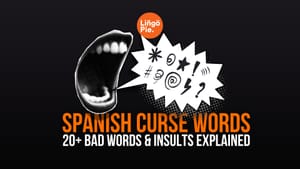Spanish is spoken in many countries, and each one makes it their own. That is why the Spanish you hear in Spain sounds different from the Spanish in Mexico, Argentina, or Nicaragua. One of the best ways to see this is through slang.
In Nicaragua, slang is part of daily life and shows the humor, culture, and unique way people express themselves. If you want to understand locals and sound more natural, learning some Nicaraguan slang is a great place to start.
In this post, I will share 19 Nicaraguan slang words and phrases and explain what they mean. You will see how they are used and how they can make your Spanish feel more connected to the people of Nicaragua.
- 80 Spanish Love Words Every Romantic Should Know
- 20 Chilean Slang That’ll Make You Sound Like A Local
- 31 Colombian Slang & Bad Words Explained (With Audio!)

Why Learn Nicaraguan Slang
Learning Nicaraguan slang is more than just picking up new words. It helps you understand how people really talk, not just what you find in textbooks. Slang gives you insight into daily life, local humor, and the unique personality of Nicaraguan Spanish. Plus, it makes conversations feel more genuine and fun.
Why learn Nicaraguan slang?
- It helps you connect with locals on a personal level
- You understand jokes, stories, and everyday conversations better
- It makes your Spanish sound more natural and less formal
- You learn about Nicaraguan culture through the words people actually use
- It can make traveling in Nicaragua easier and more enjoyable
Nicaraguan Slang And Phrases
Chunche
Nicaraguans use chunche when they forget the name of something or when the name isn’t important. It’s like saying “thing” or “thingamajig.” If someone asks you to “pásame ese chunche,” they’re just telling you to hand over that thing nearby. The meaning changes depending on context, but it’s almost always about an object you can’t name right away.
Batear
The verb batear usually means to hit in baseball, but in Nicaragua it takes on a different life. People use it to say “steal” or “rob,” and sometimes even “reject.” If someone says “me batearon,” it means they got turned down. The slang is flexible, but in everyday speech it often carries that sense of being brushed off or cheated.
Bacanal
When Nicaraguans say bacanal, they’re talking about a big party. It could be a loud gathering at someone’s house or a huge celebration with music, food, and dancing. The word paints a picture of noise, fun, and lots of people enjoying themselves. If you hear “anoche hubo un bacanal,” it means the night was full of energy.
Chochada
Chochada is another word for “thing” or “stuff,” much like chunche. If someone says “dame esa chochada,” they’re asking for that object right there, even if they don’t remember what it’s called. It’s casual, familiar, and used in everyday talk when details aren’t needed.
Maje / Mae
In Nicaragua, maje (sometimes mae) is one of the most common words you’ll hear. It’s used to mean “dude” or “buddy,” especially among friends. Depending on tone, it can sound affectionate or even slightly insulting. For example, “ese maje” could mean “that guy,” but with friends it feels more like saying “man” or “bro.”
Jaña / Jaño
These words are all about relationships. Jaña means girlfriend and jaño means boyfriend. If someone says “ella es mi jaña,” they’re saying “she’s my girl.” It’s casual and affectionate, a way of referring to a partner without using the more formal “novio” or “novia.”
Chisperos
In Nicaragua, a chispero is simply a lighter. If you need fire to light a candle, cigarette, or stove, you’d ask “¿tenés un chispero?” It’s a very straightforward piece of slang, but handy to know since the word isn’t used in other countries the same way.
Chele / Chela
Chele and chela are words Nicaraguans use for people with light skin or light hair, often foreigners. For example, a tourist with blonde hair might quickly be called “el chele.” It’s not usually rude; it’s just descriptive, and sometimes even used as a nickname.
Tapudo
If someone is tapudo, they talk too much or gossip a lot. It’s not a compliment, and usually said behind someone’s back. You might hear “ese maje es bien tapudo” to mean “that guy can’t keep quiet.” It’s a way to point out someone who spreads information too freely.
Fachento
Fachento describes a person who is arrogant, cocky, or shows off. If someone is always bragging or acting stuck up, Nicaraguans call them fachento. It’s not a nice label, but it’s a common way to point out bad manners or an inflated ego.
Dale Pues
One of the friendliest expressions you’ll hear is dale pues. It means “okay” or “go ahead,” and it’s used to agree or wrap up a conversation. If you say goodbye on the phone, adding a “dale pues” feels natural.
Coyoter
A coyoter in Nicaragua is a person who exchanges money, usually informally, like dollars for córdobas. You’ll often find them near markets or bus stations. People know them for quick, on-the-spot exchanges. The word comes from coyote, but here it refers to the middleman role they play.
Queque
This one is simple. Queque comes from the English “cake,” and it means exactly that. If someone offers you a “pedazo de queque,” they’re offering a slice of cake. It’s borrowed from English but completely adapted into daily Nicaraguan Spanish.
Ideay
Ideay is a versatile little word. It’s used when you’re surprised, confused, or annoyed. If someone gives you unexpected news, you might respond with “¡ideay!” In English, it can translate to “what?” or “seriously?” depending on the situation.
Chavalo/Chavala
These are everyday words for kids or young people. Chavalo means boy, and chavala means girl. If you hear “los chavalos están jugando,” it simply means “the kids are playing.” It’s friendly, common, and used across Nicaragua.
Tuani / Tuanis
One of the most popular slang words is tuani or tuanis. It means “cool” or “awesome.” If something was fun or impressive, you’d say “estuvo tuani.” It’s positive, casual, and used in the same way young people in English say “that’s cool.”
Salvaje
While salvaje literally means “wild,” in Nicaragua it often means “great” or “awesome.” If someone calls a party “salvaje,” they’re saying it was amazing. It’s a twist on the literal meaning, giving it a much more upbeat use.
Kiubole?
This is a relaxed way to greet someone, similar to “what’s up?” or “how’s it going?” in English. Derived from “¿qué hubo?”, it’s shortened into kiubole. Friends use it when meeting or starting a conversation.
China / Chinear
In Nicaragua, china means babysitter, and chinear is the act of holding or cuddling a baby. Parents use it all the time. If a mom says “anda a chinearlo,” she means “go pick up the baby.” It’s a warm, family-centered expression.
Where to Learn Nicaraguan Slang
The best way to pick up Nicaraguan slang is to spend time with locals. Everyday conversations teach you how words are really used, and you’ll notice quickly which expressions are friendly, funny, or more casual. Talking with people is where slang comes alive.
Watching TV, movies, or listening to music from Nicaragua is another powerful way to learn. You hear slang in context, with real intonation and body language, which makes it easier to remember and use naturally. Reading posts, comments, and news from Nicaraguans online also gives you a sense of how slang appears in writing.
And if you got inspired to learn Spanish here on Lingopie, you’re already building the foundation. Once you understand the basics of Spanish, picking up slang like the one in this guide becomes a fun next step. It’s how you move from speaking correctly to speaking like a local.
Your Next Step in Spanish

Slang is what makes Spanish feel real and alive. By learning Nicaraguan slang, you not only understand the culture better but also sound more natural when speaking. Still, slang is easier to use once you already have a solid base in Spanish.
That’s where Lingopie can help.
With Lingopie, you learn Spanish by watching real TV shows and movies with interactive dual subtitles that make new words click instantly. Once the basics click, add the slang from this guide to sound more natural and connect with locals.


![19 Nicaraguan Slang That’ll Surprise You [Guide]](/blog/content/images/size/w1200/2025/10/nicaraguan-slang.png)

![The 11 Best Brazilian Portuguese Shows on Netflix to Learn Portuguese [For Beginners]](/blog/content/images/2022/10/best-brazilian.webp)

![19 Best Spanish Series For Learning Spanish Fast [2026]](/blog/content/images/size/w300/2025/04/best-shows-to-watch-to-learn-spanish.jpg)
![How to Learn Spanish with News in Easy Spanish [Guide]](/blog/content/images/size/w300/2024/12/How-to-Learn-Spanish-with-News-in-Easy-Spanish.jpg)
![80 Spanish Love Words Every Romantic Should Know [Guide]](/blog/content/images/size/w300/2025/10/spanish-love-words.jpg)
